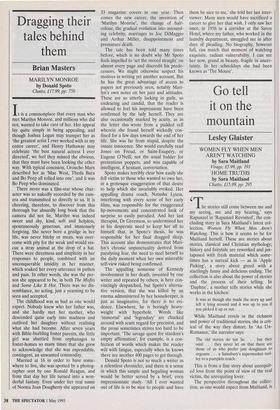Dragging their tales behind them
Brian Masters
MARILYN MONROE by Donald Spoto Chatto, £17.99, pp. 750 It is a commonplace that every man who met Marilyn Monroe, and millions who did not, wanted to take care of her. Her appeal lay quite simply in being appealing, and though Joshua Logan may trumpet her as `the greatest artist I ever worked with in my entire career', and Henry Hathaway may celebrate 'the best natural actress I ever directed', we feel they missed the obvious, that they must have been looking the other way. With typical concision, Groucho Marx described her as 'Mae West, Theda Bara and Bo Peep all rolled into one', and it was Bo Peep who dominated.
There never was a film-star whose char- acter was so nakedly recorded by the cam- era and transmitted so directly to us. It is cheering, therefore, to discover from this thorough but absurdly long book that the camera did not lie. Marilyn was indeed sweet and shy, kind, soft and helpless, spontaneously generous, and immensely forgiving. She never bore a grudge in her life, was never bitchy or mean, was over- come with pity for the weak and would res- cue a stray animal at the drop of a hat. There were directness and simplicity in her responses to people, combined with an unconquerable timidity in her manner, which soaked her every utterance in pathos and pain. In other words, she was the per- son she appeared to be, in both The Misfits and Some Like It Hot. There was no dis- semblance, no acting, just a yearning to be seen and accepted.
The childhood was as bad as one would expect. Nobody knew who her father was, and she hardly met her mother, who descended quite early into madness and outlived her daughter without realising what she had become. After seven years with Bible-burbling foster parents, the little girl was shuttled from orphanages to foster-homes so many times that she grew to acknowledge that she was expendable, contingent, an unwanted commodity.
Married at 16 in order to have some- where to live, she was spotted by a photog- rapher sent by one Ronald Reagan, and from that day her life turned into a won- derful fantasy. Even under her real name of Norma Jean Dougherty she appeared on 33 magazine covers in one year. Then comes the new career, the invention of `Marilyn Monroe', the change of hair- colour, the gradual evolution into astound- ing celebrity, marriages to Joe DiMaggio and Arthur Miller, disappointment and premature death.
The tale has been told many times before, which is no doubt why Mr Spoto feels impelled to 'set the record straight' on almost every page and discredit his prede- cessors. We might otherwise suspect his motives in writing yet another account. But he has the great advantage of access to papers not previously seen, notably Mari- lyn's own notes on her past and attitudes. These are so utterly lacking in guile, so endearing and candid, that the reader is allowed to feel his impressions have been confirmed by the lady herself. They are also occasionally marked by acuity, as in the letter she, wrote from a padded cell wherein she found herself wickedly con- fined for a few days towards the end of her life. She was far from stupid, despite the innate innocence. She would carefully read Jones on Freud, or Saint-Exupery, or Eugene O'Neill, not the usual fodder for pretentious poppets, and was capable of intelligent, if hesitant, conversation.
Spoto makes terribly clear how easily she fell victim to those who wanted to own her, in a grotesque exaggeration of that desire to help which she invariably evoked. Her appalling drama coach, Natasha Lytess, interfering with every scene of her early films, was responsible for the exaggerated lip-movements and concentrated look of surprise so easily parodied. And her last therapist, Dr Greenson, so undermined her in his desperate need to keep her all to himself that, in Spoto's thesis, he was responsible for her final drugged sleep. This account also demonstrates that Mari- lyn's chronic unpunctuality derived from paralysing fear, the need to steel herself to the daily moment when her own miserable self-view risked being confirmed.
The appalling nonsense of Kennedy involvement in her death, invented by one writer and repeated by others, is here con- vincingly despatched, but Spoto's alterna- tive version, that she was killed by an enema administered by her housekeeper, is just as imaginative, for there is no evi- dence. Elsewhere, he is boringly heavy- weight with hyperbole. Words like `immortal' and 'legendary' are chucked around with scant regard for precision, and the prose sometimes strives too hard to be important. 'The savage quest for stardom's empty affirmation', for example, is a con- fection of words which makes the reader wilt with fatigue, especially when he knows there are another 400 pages to get through.
Donald Spoto is not so much a writer as a relentless chronicler, and there is a sense in which this simple and beguiling woman would be better served by a brief, even impressionistic study. 'All I ever wanted out of life is to be nice to people and have them be nice to me,' she told her last inter- viewer. Many men would have sacrificed a career to give her that wish. I only saw her once, in 1956 in a corridor at the Savoy Hotel, where my father, who worked in the laundry department, smuggled me in after days of pleading. No biography, however full, can match that moment of watching exquisite, radiant vulnerability. I can see her now, grand in beauty, fragile in uncer- tainty. In her schooldays she had been known as 'The Mouse'.


























































 Previous page
Previous page